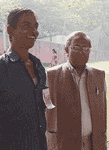
Comrade Baren played a key role in the revival and reorganization of Party work in Kolkata after the Emergency. In the early 1970s he had spent four years in jail as a political prisoner. After his release he plunged into Party work with renewed vigour and commitment. He was equally dynamic in organizing the toiling masses and the urban poor and slum-dwellers as well as the youth and the intelligentsia.
With the rise of the Indian People’s Front as a mass political platform in the 1980s, Comrade Baren displayed outstanding initiative in developing the IPF state office in Kolkata (which now serves as the Party’s state office) and launching the IPF’s weekly organ Lok Samachar (People’s News). With the party coming into the open following the Fifth Congress held in Kolkata in December 1992, the Party’s Bangla organ Deshabrati too started coming out as a weekly paper and Comrade Baren remained an ever dependable pillar supporting its uninterrupted publication in every possible way – as a writer, as a regular provider of ideas backed by investigation and analysis, and also as a comrade who would not hesitate to sell the paper at street corners and railway stations.
Since the late 1980s, Comrade Baren had also taken up journalism as a profession. He began his professional journalistic career as a correspondent with Pratikshan, a Bengali fortnightly that had held out a lot of promise before becoming a victim of ‘infant mortality’. Following the closure of Pratikshan, Baren took to business reporting and became a keen and insightful analyst on matters pertaining to the jute and tea industries in West Bengal. Working closely with veteran journalists like Sankar Ray and Partha Majumdar, Baren kept contributing to various English newspapers including Business and Political Observer (later Observer of Business and Politics), The Statesman, Financial Express and Hindustan Times.
Comrade Baren was an extremely lively, warm-hearted and spirited comrade who never demanded anything for his own self and always gave his very best to the Party. He was known as an outspoken comrade who never hesitated to call a spade a spade and criticize any comrade in his face, but he did this in the best interest of the Party and harboured no personal rancour against anybody.